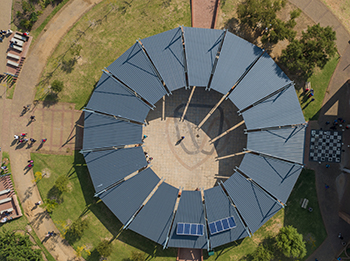Latest News Archive
Please select Category, Year, and then Month to display items
08 May 2024
Photo SUPPLIED

The Dean of the Faculty of Natural and Agricultural Sciences, Prof Paul Oberholster, has the pleasure of inviting you to the inaugural lecture of Prof Dirk Opperman.
Date: 21 May 2024
Time: 17:30
Venue: Equitas
 Click here to RSVP before Wednesday, 15 May 2024. Alternatively, contact Christelle van Rooyen on +27 51 401 9190.
Click here to RSVP before Wednesday, 15 May 2024. Alternatively, contact Christelle van Rooyen on +27 51 401 9190.
About Prof Dirk Opperman
Prof Dirk Opperman obtained his PhD in Biochemistry at the University of the Free State in 2008. This was followed by postdoctoral research on directed evolution with Prof Manfred T Reetz at the Max Planck Institute for Coal Research (Germany). In 2010, he was appointed in the Department of Microbiology and Biochemistry. He subsequently established structural biology at the UFS, and his current research focus lies at the interface of evolutionary and structure-function relationships of biocatalysts, and their application in green chemistry. He is an NRF B-rated researcher with co-authored papers in Science, Nature Communications, and Angewandte Chemie.
His research has been funded by both local and international organisations, ranging from industries such as SASOL to the Global Challenges Research Fund (GCRF, UK). He has a long-standing collaboration with researchers at the Delft University of Technology (TUDelft, the Netherlands) and is currently part of a European Research Area Network Cofund (ERA-NET Cofund) partnership on Food Systems and Climate (FOSC) that develops biocatalysts for upcycling waste.
Renewable energy systems an economical investment for the UFS
2017-06-14

The Qwaqwa Campus Arena equipped with freestanding
roof solar panels.
Photo: iFlair Photography
Renewable energy systems are said to be very expensive to implement initially, but in the long run they provide high economic returns.
With their decision to install renewable energy, the University of the Free State Department of Facilities Planning has now also adopted this innovative technology. They have chosen less capital-intensive solar power-generating options to generate electricity in various buildings and parking areas on all three UFS campuses.
“As per the UFS Energy Management Policy, all designs incorporate efficient, renewable energy sources varying from LED lights to solar power,” says Anton Calitz, Electrical Engineer in University Estates’ Department of Facilities Management.
South Campus taking the lead in renewable energy usage
In December 2016, a total of 26 solar-driven LED street-light poles were installed at the recently built Legae Residence’s parking area and the perimeter security area on the South Campus. This low-maintenance system improves security after dark and is independent of the national power supply, which is an important advantage during power outages. With no requirements for major earthworks and cable setting, operational costs are reduced.
The recently built infrastructure also takes pride in being the first to have a greywater system installed. This system will also be installed at three other residences on the Bloemfontein Campus in 2017. Greywater is made up of bath, shower, and bathroom sink water. The water is reused for toilet flushing, as well as for irrigation purposes.
Various UFS electrical operations to depend on solar power
On the Bloemfontein and Qwaqwa Campuses, the computer laboratories as well as the Thakaneng Bridge Student Centre and the projected Afromontane Research Centre will be equipped with freestanding roof solar solutions during 2017. These systems are designed to operate independently of the power grid (Eskom).
The systems only operate during sunlight hours when the PV solar panels are heated by the sun, making them suitable for operations such as ventilation fans, water pumps, and small circulation pumps for solar thermal water-heating systems.